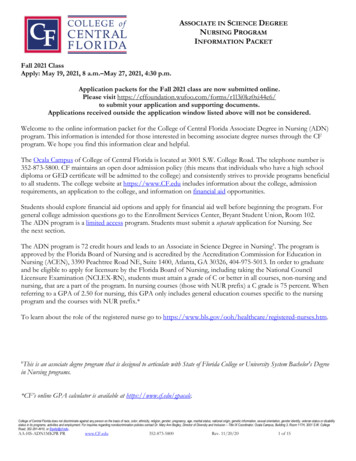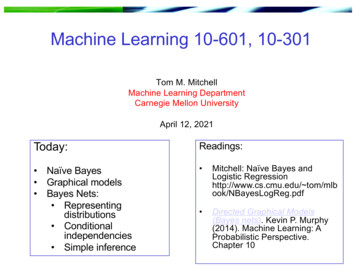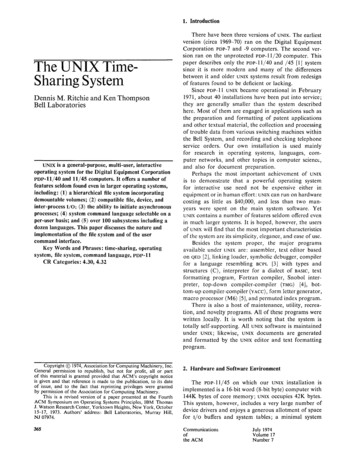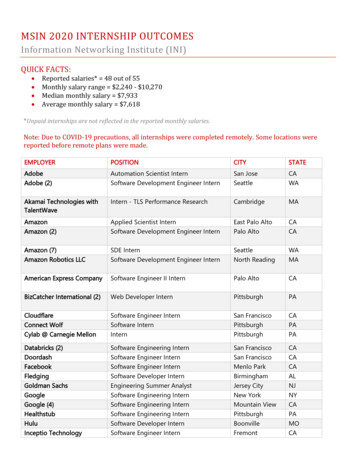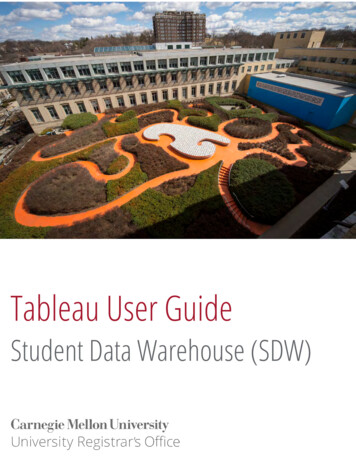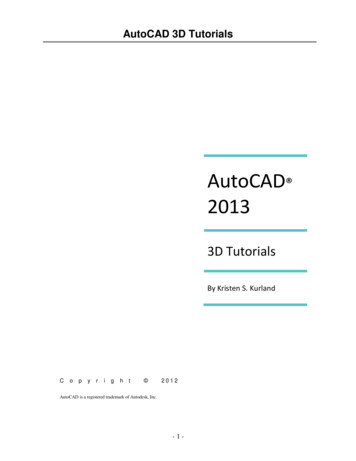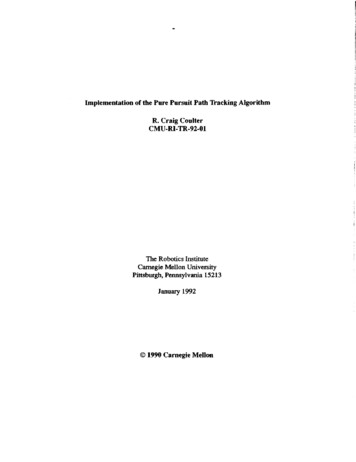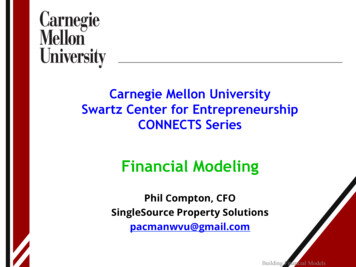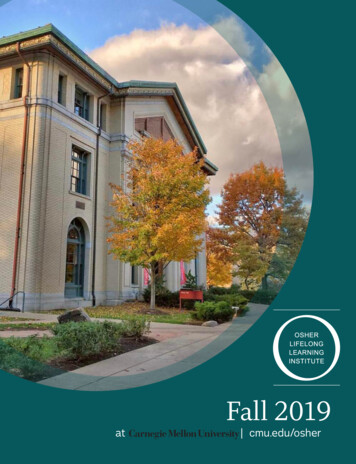
Transcription
atFall 2019 cmu.edu/osher
CONSIDER A GIFT TO OSHERTo make a contribution to the Osher AnnualFund, please call the office at 412.268.7489, gothrough the Osher website with a credit card, ormail a check to the office. Thank you in advancefor your generosity.BOARD OF DIRECTORSCURRICULUM COMMITTEEOFFICE STAFFJim Reitz, PresidentAllan Hribar Vice-PresidentJan Hawkins, SecretaryMarcia Taylor, TreasurerJohn Olmsted, Past PresidentRosalie BarsottiGary BatesJane CordiscoLee FogartyJeffrey HolstAnn IsaacRaja SooriamurthiJeffrey SwogerRandy WeinbergMark WinerGary BatesLester BerkowitzJohn BrownMaureen BrownFlip ContiCirce CurleyJan DavisLyn DeckerMary DuquinAnna EstopLee FogartyByron GottfriedMarilyn MaielloEnid MillerJudy RubinsteinRochelle SteinerMona StrassburgerJeffrey SwogerRandy WeinbergRichard WilsonLyn Decker, Executive DirectorChris Dashti, Administrator / ProgramsChelsea Prestia, Administrator / PublicationsOlivia McCann, Administrator / General OfficeAmy Burkert, Vice Provost forEducation and our UniversityLiaisonCATALOG EDITORSChelsea Prestia, EditorChris DashtiOlivia McCannHelen-Faye RosenblumRosalyn TregerCONTACT INFORMATIONOsher Lifelong Learning InstituteCarnegie Mellon University4614 Wean Hall5000 Forbes AvenuePittsburgh, PA 15213-3833Please include your return addresson all mail sent to the Osher office.Phone: 412.268.7489Email: osher@cmu.eduON THE COVERWebsite: cmu.edu/osherThe sloping halls in Baker/Porter Hall were built to accommodate large machinery as it originally housed the School ofApplied Industries and had machine shops for students studying everything from plumbing and heating to “electricalpractice.”Front Cover: Chelsea PrestiaAdditional catalog images courtesy of Olivia McCann, David Bachman, Amanda Cochrane and Duane Rieder, Pexels, and Wikimedia Commons
OSHER at Carnegie Mellon Fall 2019What interests you? Find your courses by topic.ARTS & HUMANITIESLEARN BY DOINGSCIENCEArt5Art21Architecture42Drama / Theatre7Crafts / 43Literature9Dance / Exercise24Life Science44Finance / ogy50Music & Drama32Music13BUSINESS &COMMERCEBusiness17Self-Improvement32SOCIAL mporary Topics /Sociology51Writing39History58General InfoPittsburgh62Politics / Government64Directors & Staff Front CoverReligion / Philosophy66One & Two Day ClassesTravel674Index byStudy Leader Name78-81Campus Map82-83General Information& Policies84Parking & Transportation84Bad Weather84Code of Conduct85Skip Dates86Refund Policy86Registration Info86IMPORTANT!It is in your best interest to register online.Paper registrations will be delayed andprocessed one week after registration opens.Session DatesSession One: September 3 - October 25List of Courses by Day: pgs. 68-72Session Two: October 28 - December 20List of Courses by Day: 73-77The course descriptions and biographies have been edited with an eye to preserving the voice and spirit of our study leaders.412.268.74893e: osher@cmu.eduw: cmu.edu/osher
ONE-& TWO-DAY COURSESHaving trouble committing to a six-week course? Try one of our one-and two-day classes listedbelow. For full course description, Study Leader biography, dates, and times, please see thecourse listed on its assigned page.Start Date # of classes Class ID Class NamePage #10/323037Creative Process of CMU's School of Drama Plays10/923101Why Giselle Matters10/1413049Bird Migration Around The World10/1412953Intro To Medical Marijuana And Its Medicinal Value10/1512931A Musical Retrospective Of Cole Porter10/1512955City Of Asylum, Pittsburgh10/1522948The Mattress Factory10/1523042Library Of America: Champion Of Our Great Writers10/1523045AARP Smart Driver 8-Hour Course10/1522934What's Happening With Religion In America?10/1623053Worst Trade Agreement? The Real NAFTA10/1713046AARP Smart Driver 4-Hour Renewal Course10/1723023How Museum Building Projects Can Succeed10/1812933Tour Of ALCOSAN10/1822977Thinking About The Economics Of Climate Change10/1823031Introduction To Cryptocurrency/Bitcoin10/2113048PowerPoint Tour of The Pittsburgh Zoo and PPG Aquarium10/2113021The Illustrated History of Squirrel Hill10/2113030On Safari In Botswana10/2213071Such Friends: Max Perkins and F. Scott Fitzgerald10/2213047Falconry, The Sport Of Kings10/2212947Regenerative Medicine10/2213022Truth And Power: The Past And Future Of Education10/2212988Jimmy Doolittle And The Raid To Avenge Pearl Harbor10/2213085The Politics Of Coups D'etat10/2313091Universal Basic Income: What's It All About?10/2313008The Biology Of Aging10/2313083Welcoming Refugees: From Global To Local10/2312941Pittsburgh Botanic Garden - From Black To Green10/2412978Verbal Self Defense For Women10/2413057Where Are The Boundaries?10/2413056Insights Into The World Of Elite Tennis Athletes10/2512950Create Trendy Jewelry10/2513084How Does It Matter Who The President Is?11/1813005The Art Of The 51950576436545423578You must be registered to attend these courses.OSHER Fall 20194w: cmu.edu/osher
ARTS & HUMANITIESArt Drama/Theatre Language Literature MusicCINEMA/FILMLady Justice Goes To The MoviesStudy Leader: Lloyd Stires, Diane Berman 6 Classes: Sep. 3 – Oct. 15* Tuesday, 3:15 PM - 6:15 PM Wean Hall, 4708Class ID: 3087*Note: Class will not meet on Oct. 8The courtroom drama has been a staple of American cinema for decades and has resulted in many excellent films.However, filmmakers have also been known to take liberties with law and procedure in order to enhance the dramaof courtroom scenes. We will watch and discuss six filmsfrom the 1950s and 1960s that raise both social and legalquestions, and that illustrate trial tactics still being usedtoday. Two study leaders with different professional backgrounds—social psychology and the law—will lead a discussion of issues and themes presented by each film.Please note that this is a film discussion class. It is hopedthat, after the movie is shown, you will be able to remainfor the duration of the class.ARTThe Mattress FactoryStudy Leader: Mattress FactoryLloyd Stires (Ph.D., Duke University) is a retired professor ofpsychology at Indiana University of Pennsylvania, where hetaught social psychology, environmental psychology, and massmedia and behavior. He was a jazz and blues disc jockey onWIUP-FM. He blogs about social science and current events.Materials Fee: 10* 2 Classes: Oct. 15 and Oct. 22Class ID: 2948 Tuesday, 10:00 AM - 11:30 AM The Mattress Factory, 500 Sampsonia WayDiane Berman (Phi Beta Kappa, Chatham College; Universityof Pittsburgh Law School) retired after 42 years as a Deputy District Attorney in Allegheny County. During that time, she prosecuted numerous murder and major felony trials, and also servedas the Legal Advisor to the Allegheny County’s InvestigativeGrand Juries for 20 years. She has taught both attorneys and lawenforcement in various specialized areas of criminal law, including grand jury law, electronic surveillance, complex narcoticsinvestigations, and institutional sexual assault.The Mattress Factory was founded in 1977 by artists tosupport artists working in residence to create site-specificinstallations. The museum supports established andemerging artists through a residency program that hasbecome the pilot program for artist residences in institutions worldwide. Get an exclusive look at our history, ourexhibitions, and our programs. The first class will be aguided tour of the exhibits, and the second class will be apresentation of the history and programming of the Mattress Factory.The Mattress Factory is a museum of contemporary installationart.*Materials fees are not refundable; information on page 86.412.268.74895e: osher@cmu.edu
ARTS & HUMANITIES Cinema/FilmCinema Arts:The Foreign Documentary IBiography And Memoir:On Film And WrittenStudy Leader: Charles GlassmireStudy Leader: Stephen Stept 5 Classes: Nov. 1 – Dec. 6* Friday, 1:00 PM - 4:00 PM Wean Hall, 4708Class ID: 2982 3 Classes: Sep. 9 – Sep. 23 Monday, 1:00 PM - 3:00 PM Wean Hall, 4708*Note: Class will not meet on Nov. 29In three sessions we will discuss biography and memoirthrough film and personal writing. Session one will be afilm screening of my own documentary biographical filmwork (90 minutes) followed by class discussion. Sessiontwo will be a screening of a second film that I produced(also 90 minutes), followed by class discussion. Sessionthree will be a discussion of memoir writing. The twofilms are biographies of 20th century media mogul, HenryLuce; and Jim Jones of Peoples Temple and Jonestown.This course will exhibit some of the classic and/or seldomseen documentary films made in foreign lands by creativefilmmakers who stimulated the evolution of the cinema asan art form. The format will be a one-to two-hour filmscreening, followed by a class discussion of the film. Thiscourse will suggest that the documentary form, while representing to show us truth, is changing the way we viewthe world, and thus, the way we interact with our world.The films shown will be a mixture of classic documentaryand some seldom seen but fascinating contemporary documentary works.Stephen Stept is a veteran a producer, writer, and director ofaward-winning documentary films for PBS, Discovery, HistoryChannel, MSNBC, WQED, and many others. His list of prestigious honors includes the DuPont-Columbia, Peabody, Emmy,Humanitas, and Writers Guild Awards. Stephen has written,directed, and produced programs for Bill Moyers, Rachel Maddow, and the late Peter Jennings. He has conducted hundreds ofinterviews, ranging from Hall of Fame athletes to Nobel laureates to Holocaust survivors, and has written dozens of narrativetreatments and documentary scripts.Charles Glassmire, digital artist, filmmaker, and former nuclearengineer, has taught filmmaking and cinema arts at four collegesand universities. His 16mm films have been screened nationallyand purchased by major museums. He wrote the original proposal for Pittsburgh Filmmakers, now an internationally recognized media arts center, and taught filmmaking, film history, andfilm editing there. He established the digital arts program at theUniversity of Pittsburgh in the studio arts department, trainedfaculty in use of digital arts tools, and taught credit courses in thestudio arts department as an adjunct professor. He created theadvanced computer graphics laboratory at Pitt, supervised thelaboratory operation for several years, and secured funding tooutfit the entire laboratory with computer equipment. In theCarnegie Mellon art department pre-college summer art program for gifted high school students, he taught filmmaking andanimation using the Cray supercomputer. He currently teachesdigital computer arts for Osher, the Community College ofAllegheny County, and for young adults on the autism spectrumat the Computing Workshop in Squirrel Hill. He holds a B.S.degree in physics and an M.F.A. degree in film from ColumbiaUniversity in New York City.OSHER Fall 2019Class ID: 29356w: cmu.edu/osher
Drama/Theatre ARTS & HUMANITIESDRAMA/THEATRECreative Process Of PlaysAt CMU’s School Of DramaStudy Leader: Richard Block 2 Classes: Oct. 3 and Nov. 14 Thursday, 5:30 PM - 6:30 PM Purnell Center, Chosky TheatreClass ID: 3037Based on the two Chosky Theatre productions of theSchool of Drama, these two sessions are discussions withthe members of the production team (director, dramaturg, management, designers) of each play, providinginformation about how theatre productions are createdand why.Please note: Dates of plays are October 3, 2019 and November 14,2019. If you want to see the plays, you must purchase a ticket.Why Giselle MattersDick Block has been the Associate Head of the School of Dramafor over 15 years and has worked professionally as a scenicdesigner for over 3 decades.Study Leader: Lisa Auel 2 Classes: Oct. 9 and Oct. 16Class ID: 3101 Wednesday, 10:00 AM - 12:00 PM Pittsburgh Ballet Theatre,2900 LibertyAve.Though Giselle is more than 150 years old, it remains oneof the most important and beloved ballets in the classicalrepertory. This two-part class explores the meaning andsignificance of the ballet to the art form and its relevanceto audiences today. Session 1 is a basic introduction to theballet art form; session 2 is a deeper look at Giselle and itshistory, context, choreography, and meaning.Please note: First class is one hour (10-11am).Lisa Auel is the Pittsburgh Ballet Theatre’s manager of community programs and archives. She holds a master’s degree in American Studies from George Washington University and a B.A.degree in English from the College of William and Mary. She hasworked at the P.B.T. for six years.412.268.74897e: osher@cmu.edu
ARTS & HUMANITIES Drama/Theatre LanguageThe Art Of The CityLANGUAGEStudy Leader: Katie Trupiano 1 Class: Nov. 18 Monday, 4:00 PM - 5:30 PM City Theatre,1300 Bingham St., South SideClass ID: 3005Etymologies VII: “Who Knew?!”Study Leader: David Fortun 5 Classes: Oct. 31 – Dec. 5* Thursday, 11:15 AM - 12:45 PM Wean Hall, 4708In this course, City Theatre staff such as the dramaturg,managing director, set designer, costume designer, andlighting director will present significant people connectedto the current production. Actors, playwrights, designers,theatre management, and others may interact with CityTheatre staff and bring to light behind-the-scenes material that will enhance and deepen everyone’s theatre experience. This class will meet at City Theatre.Class ID: 2937*Note: Class will not meet on Nov. 28Who knew that the saying “Back to Square One” was originally a soccer reference? That a “Geisha” is an “art” (gei)“person” (sha)? That “Queensland” (Australia) was sonamed only because “Victoria” was already taken? Thatthe “Hasbro” toy company was founded by and namedafter the HASsenfeld BROthers? Who knew? I didn’t. Andthere’s a good chance you didn’t either. Etymologies VIIgives us a chance to explore these and 246 more word,name, and phrase origins, as well as the stories behind theterms. And by the end of the course, you will be able toanswer, “I knew.”Katie Trupiano is the Education and Accessibility Manager atCity Theatre Company. For the past six years, she has also servedas a teaching artist for the Young Playwrights program to helpmiddle and high school students find their voices and tell theirstories through theatre. She also teaches for City Theatre’s ArtsAccess program, working to make the arts accessible to all learners. Katie also works as a teaching artist for the Pittsburgh Cultural Trust and the Carnegie Museum of Natural History. Sherecently completed the Executive Program for Arts and CultureStrategy from the University of Pennsylvania and National ArtsStrategies.David Fortun is a retired English teacher from Shaler Area HighSchool. He has taught six etymology classes in the Osher program at Carnegie Mellon. A lifelong baseball fan, he has conducted tours at PNC Park for 12 years and has shared his knowledge of Pittsburgh baseball with his fellow Osher learners.ImportantTo attend a course, you must havereceived a course confirmation forthat course through the office.Please don't confuse the courseconfirmation with a wait list notice.We appreciate your cooperation.OSHER Fall 20198w: cmu.edu/osher
Literature ARTS & HUMANITIESSouthern Gothic Short StoryLITERATUREStudy Leader: Rebecca Carpenter 5 Classes: Sep. 6 – Oct. 4 Friday, 11:15 AM - 12:45 PM Wean Hall, 4707Return To Maycomb:A Homage To Harper LeeStudy Leader: Michael Mariani 6 Classes: Oct. 29 – Dec. 3 Tuesday, 9:30 AM - 11:00 AM Wean Hall, 4707Class ID: 3069Southern Gothic has enjoyed a revival in recent years intelevision, movies, and music. We may not be able toreproduce dripping live oaks, swamps, and sinister characters lurking in the bayous in Pittsburgh, but we’ll try! Asa group, we will look at the eerie, often unnerving, andprovocative stories of the Southern Gothic genre, including works by Truman Capote, Flannery O’Connor, andEudora Welty. Discussion topics will cover the sublime,the shadow, the effects of place, and the outsider as keyelements in the production of this distinct literary genre.Class ID: 2992Harper Lee’s To Kill a Mockingbird showcases a literarymastery of language while telling a compelling story. Itssustained popularity is unprecedented. Some call it thegreat American novel. This class studies this meritedacclaim through Harper Lee’s characterization and juxtaposition of lively, memorable, and iconic characters. Thebrilliant point of view, told by a child through whose eyeswe see and experience stark bigotry and racism, friendship and loyalty, truth and secrets — still mainstay issuestoday. Media bombard us with numbing images while Ms.Lee lets us “peek behind closed doors” to learn, live, andunderstand as Scout, Jem, and Dill witness insidious prejudice, unfailing courage, and the power of truth and love.Our appreciation of Mockingbird builds with each reading,reflection, and discussion of the literary art, craft, andskill used by, as Truman Capote said, “Someone rare . . . awriter with the liveliest sense of life . . .”Rebecca Carpenter has been an educator for almost 40 years.She taught English literature and writing in both public and private high schools, college, and graduate school. In addition, shetaught English in Duquesne University’s School of Leadershipand Professional Advancement’s Saturday program for 25 years.After 19 years, she recently retired from Literacy Pittsburghwhere she taught adult literacy classes, trained volunteers, anddeveloped and managed special projects, including HealthLiteracy.Mike Mariani retired from teaching English after 42 years. Hereceived his B.S. in education from Duquesne and master’sdegree in English from Catholic University. He believes Englishis not only the conduit through which information is gained andgiven, but it’s the subject that best lends itself to the discussion,understanding, internalization, and development of individuality and community. Mariani’s love of reading and literature led toa love of writing, and the analysis of writing enhanced his appreciation of literature. Since reading and writing are intertwineddisciplines, an active study of literature comes from reflectivewriting and participatory discussion, a literary passage or poeticresponse, memory and imagination expressed in syntax and context, or the relationship of symbol and meaning. Mariani broughtauthors to his classes to discuss the writing process and whathappens when we read. From novelist Larry Bond, to PulitzerPrize poet Henry Taylor, to DC Poet Laureate Dolores Kendrick,their insights became incorporated in his literature and writingclasses. Mariani has published poetry in Virginia Writing andop-ed articles in the Journal Newspaper.412.268.74899e: osher@cmu.edu
ARTS & HUMANITIES LiteratureDaring To DiddleThrough Dickens’ Bleak HouseShort Stories:The Shape Of The Whole — IIStudy Leader: Gloriana St. ClairStudy Leader: Helen-Faye RosenblumMaterials Fee: 5* 6 Classes: Sep. 12 – Nov. 21 Thursday, 1:00 PM - 2:30 PM Wean Hall, 4707Class ID: 3065 6 Classes: Sep. 9 – Oct. 21* Monday, 1:00 PM - 3:00 PM Wean Hall, 4707In the bleak midwinter, you can curl up beside your fireplace with your cat, your reading glasses, your antimacassar, your tea, and your copy of Charles Dickens’ 900 page novel, which is competing with the cat for your lap.Dickens, whose new biographers have deemed to be avery devil of a husband and father, continues to entertainhis readers, following faithfully the mandate to educationand entertain simultaneously. A variety of movies and TVseries, especially the 2005 BBC classic Bleak House willallow you to envision the characters. Being astute Oshermembers, you will see that not much has changed vis-à-vissociety and its treatment of its citizens. Folks continue tobe born, suffer, fi
animation using the Cray supercomputer. He currently teaches digital computer arts for Osher, the Community College of Allegheny County, and for young adults on the autism spectrum at the Computing Workshop in Squirrel Hill. He holds a B.S. degree in physics and an M.F.A.


